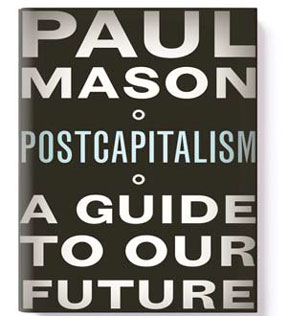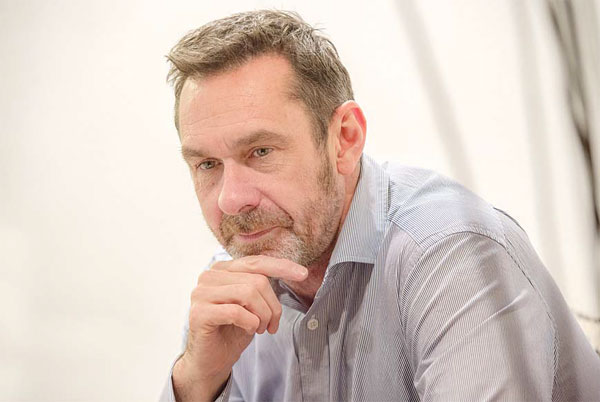China 'needs consuming working class'

Award-winning broadcaster and author says Marx's prophecy about the end of capitalism is well nigh
Paul Mason believes that people innocently sharing free music on the Internet - as is particularly the case in China -could spell the end of capitalism.
The broadcast journalist and author, who has won multiple awards, argues in his new best-selling book, Postcapitalism, that the digital revolution could finally make Karl Marx's prophesy about the end of the economic system that has dominated since the mid-18th century British Industrial Revolution a reality.
| Paul Mason's Postcapitalism is not a conventional journalist's book but more of a polemic. Nick J.B. Moore / For China Daily |
"If you have got something - no matter what its production costs are - that can be reproduced infinitely, then sooner or later under free competition its price is going to fall close to zero," he says.

"We can see this in digital music. When I first started writing this book, I had research that showed that Apple had 95 percent of digital music. Obviously, that was just the digital music market. It doesn't tell you that a whole unmeasured chunk of digital music was being shared for free."
Mason, who made the headlines last month by quitting his high-profile role as economics editor of Channel 4, was speaking in a cafe opposite the ITN studios at Gray's Inn Road in central London.
The book, which has been reviewed across the world and involved the author in an extensive speaking tour, is not a conventional journalist's book but more of a polemic.
"My previous four books, including a novel, were written from my experience as a journalist. This book is written from my lifetime engagement with two issues: social justice and technology. In my mind I believed they were separate, but that has all changed."
That change has been the Internet and the availability of an almost infinite supply of information, and the emergence of open-source operations such as the online encyclopedia Wikipedia, where there is no profit motive.
"Capitalism cannot deal with abundance since, like all previous economic systems, it is a solution to scarcity. The capitalist solution is to distribute goods according to the market. The feudal solution was according to obligation. The Han Chinese solution was semi-slavery, peonage and obligation," he says.
Mason, a regular visitor to China during his broadcasting career, believes the Chinese government is more aware of the challenges posed by the digital revolution than many in the West.
"The upper reaches of the CPC (Communist Party of China) do engage with all these things. They think very broadly and talk very aggressively about nonmarket technology. Certainly, China's young people are engaging with technology."
Mason says far from all this being pie in the sky it could have profound implications for the way people live and, more importantly, work in less than a generation.
He believes the Internet of Things - machines speaking to machines - will destroy white-collar as well as blue-collar jobs.
Instead of mass unemployment he believes the solution is for everyone to have a basic income from the state so they could do other things like community work, study or look after an elderly relative.
For example, he says, that the cost of giving everyone in the UK 6,000 pounds ($8,390; 7,700 euros) a year would double the current benefits bill, but there would be ways of offsetting the cost.
There would still be incentives to work with the minimum wage being set at a much higher level.
"The basic income is coming and it is a near-term issue. I had a debate with a bunch of rightwing economists a couple of weeks ago and they said it wouldn't work because people are naturally acquisitive and competitive and want to be richer than their neighbors. I said that I knew that was not the case because I grew up in a community that had real social solidarity," he says.
Mason is the son of a lorry driver and a primary school headteacher and was brought up in the relatively working class town of Leigh, now in Greater Manchester.
After studying music and politics at Sheffield University, he pursued a somewhat unconventional career. He started out as a music teacher and then a lecturer before switching to be a journalist on trade publications in the 1990s.
He came to prominence as an expert interviewee on the dotcom crash and then landed the plum job as business correspondent of the BBC flagship news and current affairs program Newsnight in 2001. He moved to Channel 4 in 2013.
Mason, who was described recently as a Renaissance man by his Channel 4 boss on the announcement of his departure, which will take effect later this month, has been heavily engaged in covering the Greek crisis and interviewing Prime Minister Alexis Tsipras.
"Greece has failed in its attempt to break out of the debt servitude forced on it by Germany. My fear is that Europe is supposed to be based on laws and agreements, but it is now becoming more based on force."
He believes it is possible that Britain could vote to leave the EU in a referendum in June.
"Don't blithely assume that Britain will vote to stay in. As we watch all this disintegration, people will become wary about remaining part of it."
Despite fears in the West about China's slowing growth and the slump in the stock market, Mason is confident about the outlook for the world's second-largest economy.

"You are still left with real things. There are real high-speed trains, there are real bridges and there really is new housing. To me, the outlook for China is long-term positive.
"The task for China is one of transition and to create, in particular, a consuming working class - not a middle class, as some assume - but workers with higher wages. I actually think the Chinese Communist Party underestimates its economic achievement because it constantly wants to downplay expectations."
While Mason believes that capitalism may survive in some form, he argues that neoliberalism, which has been in the ascendant in the West since the 1980s but in his view has only led to greater inequality, is facing its death knell.
He argues in his book there is evidence for this even from the Kondratieff wave theory named after Russian economist Nicolai Kondratieff, who Stalin eventually had executed, that the current form of capitalism is now incapable of moving on from the 2008 crash.
He believes financialization has reached its limits and is an existential threat to the global economic system with the value of financial derivates globally rising from just $50 billion in 1991 to $38 trillion now when the real economy is just $70 trillion.
"It is like building a nuclear power station with terrible management next to a village," he says.
* Postcapitalism by Paul Mason (Allen Lane) will also be published in paperback in June.
andrewmoody@chinadaily.com.cn
(China Daily European Weekly 03/04/2016 page32)
Today's Top News
- New engine powers cargo drone expansion
- China to boost intl cooperation on green tech
- Factory activity sees marginal improvement in November
- Venezuela slams US' 'colonial threat' on its airspace
- Xi: Strengthen cyberspace governance framework
- Takaichi must stop rubbing salt in wounds, retract Taiwan remarks































